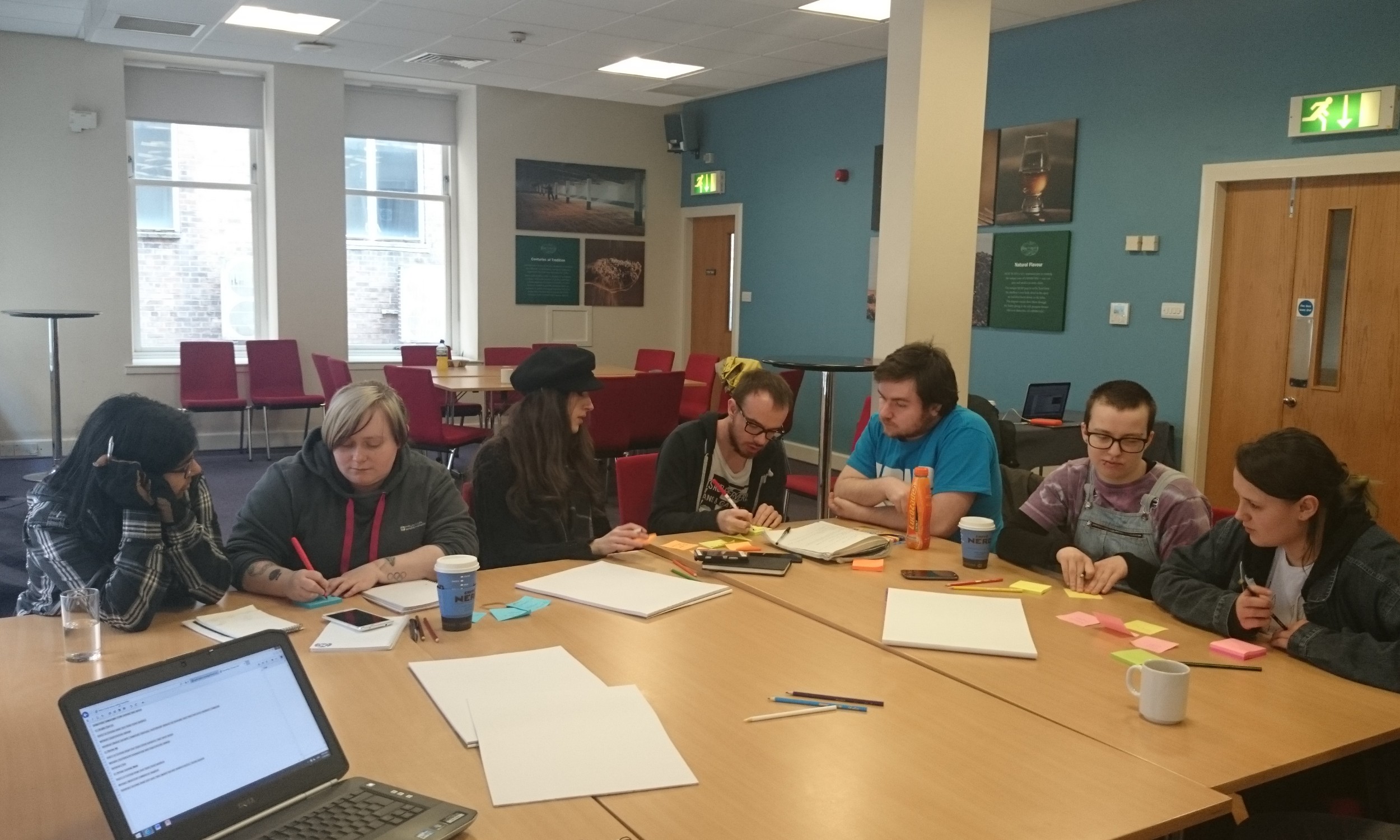On Friday 18th and Saturday 19th March, we helped Scottish Union Learning and BFAWU (Bakers’ Union) to facilitate Game Plan, a training academy for young activists involved in various campaigns. Coming together with trade unionists, artists and techies, we explored the literacies in creative, open source activism through a series of participatory sessions at the IET Teacher Building in Glasgow. With an inclusive approach focusing on expression, experimentation and sharing, our aim was to help participants acquire the skills to define and drive their own campaigns, drawing inspiration not only from activism but also from art and community-led technology projects.
BFAWU Youth Leadership course pic.twitter.com/DlcEJbdvMO
— John Slaven (@JohnSSUL) March 18, 2016
Trade union activist Walton Pantland introduced the event by calling on participants to “hack” the movement, redefining it to reflect their own experiences of the modern world of insecure work.
Finding Your Voice
In the first session on Friday, hip hop musician, writer and activist Darren McGarvey (Loki) led a rap writing workshop. Reflecting on the importance of communicating activist messages beyond their traditional communities—reaching people who don’t “speak union”—Darren performed a short piece and invited discussion on its content. Touching on the effectiveness of messages that draw on emotion and identity (rather than e.g. a list of workers’ rights), Darren then helped participants to work on their own raps in small groups. 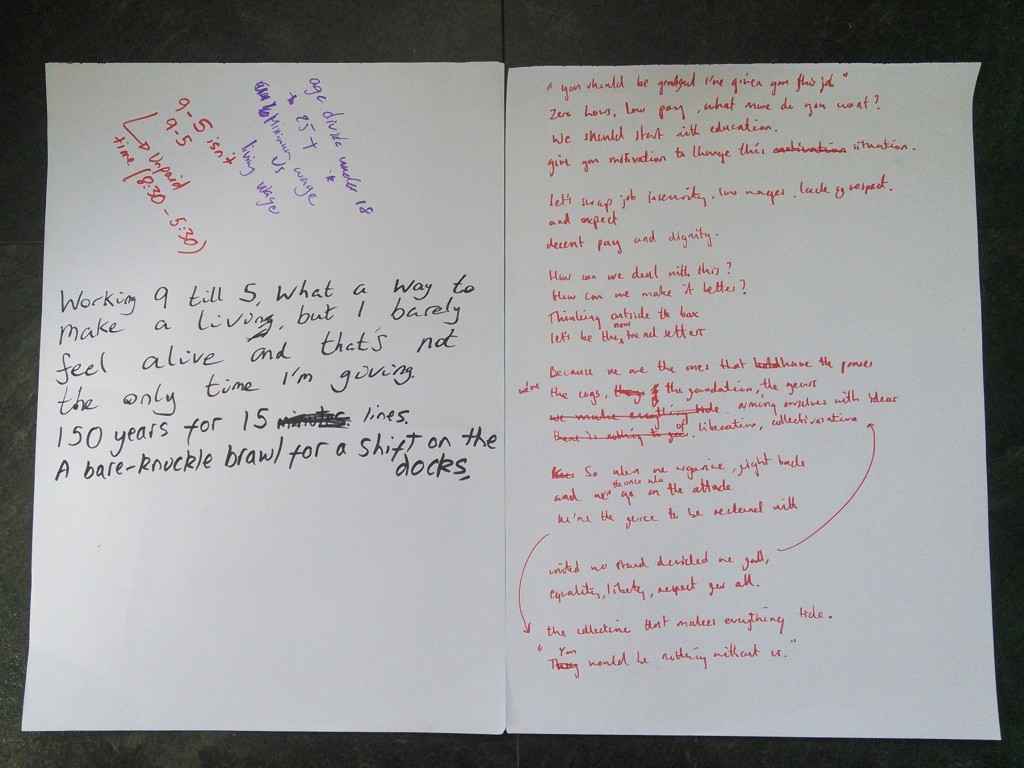 After performing the results back to the group, participants reflected on the process, highlighting the importance of reaching outside your own “echo chamber” and avoiding assumptions about your audience. Encouraging activists to ask themselves “what is it like to be receiving this message”, Darren stressed the importance of experiences and aspirations over tools and technologies, as well as the apathy that can result from alienating people. Finally, Darren noted the value of engagement with activist campaigns, even when they fail to meet their objectives, as the quality of the journey can have an impact that extends throughout the lives of those involved.
After performing the results back to the group, participants reflected on the process, highlighting the importance of reaching outside your own “echo chamber” and avoiding assumptions about your audience. Encouraging activists to ask themselves “what is it like to be receiving this message”, Darren stressed the importance of experiences and aspirations over tools and technologies, as well as the apathy that can result from alienating people. Finally, Darren noted the value of engagement with activist campaigns, even when they fail to meet their objectives, as the quality of the journey can have an impact that extends throughout the lives of those involved.
True Stories
Walton Pantland began exploring the importance of stories in campaigning by sharing his own experiences of growing up in apartheid-era South Africa and describing how these led him into trade union activism. Stressing that people connect to activist messages emotionally rather than intellectually, Walton focused on the importance of authenticity and the ways in which personal stories combine to form meta-narratives, in turn determining how we see ourselves—and what we see as achievable.
At the excellent Game Plan workshop for @BFAWUyouth fast food union activists – great organisation by @HackAye pic.twitter.com/DccXrOgLCt — Walton Pantland (@Leischa) March 19, 2016
Challenging participants to subvert the current prevailing political narrative of austerity in the UK (“there isn’t enough to go around”, “you millennials are spoilt”, “you live in a digital utopia” etc), Walton invited the young activists to tell their own stories and to encourage others to do the same.
The Power of Information
Journalist and researcher Jenna Corderoy led an informative session on using Freedom of Information, Environmental Information and Subject Access Requests, sharing a host of practical tips and resources for making successful requests for various sources of public information. Running through the processes involved in these requests, Jenna also shared online sources of financial information as well as strategies for navigating them. 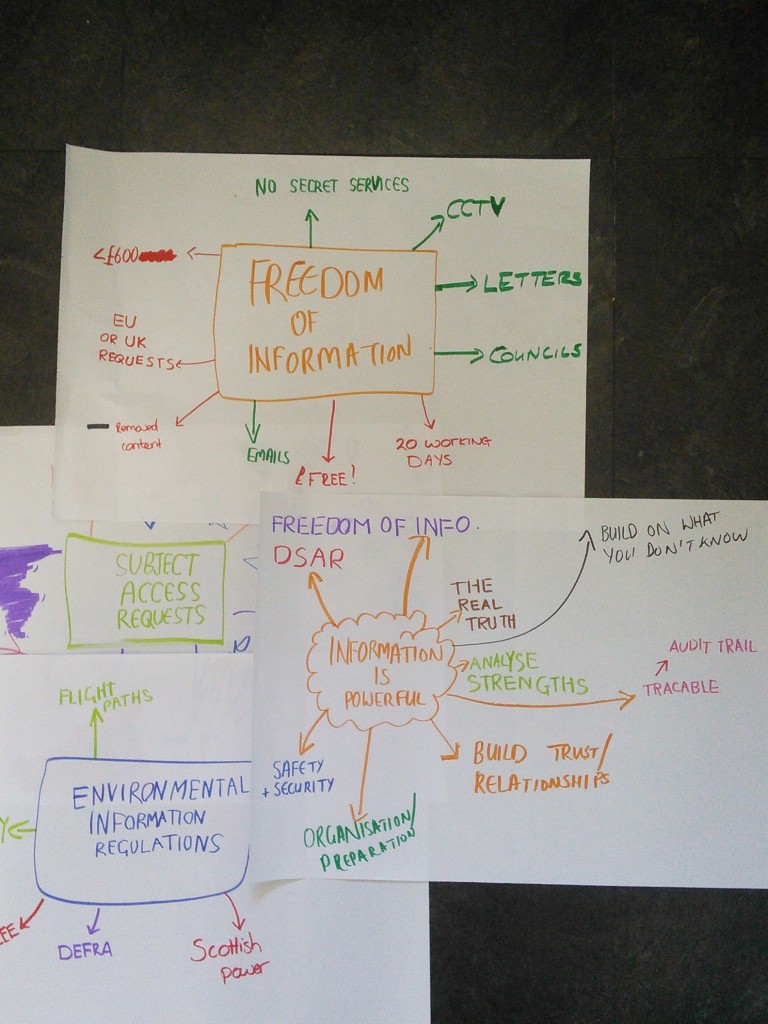 Following this presentation, Jenna led a workshop in which participants brainstormed approaches for sourcing and using information in particular scenarios, with attendees also sharing their own experiences of using public information requests in activist projects.
Following this presentation, Jenna led a workshop in which participants brainstormed approaches for sourcing and using information in particular scenarios, with attendees also sharing their own experiences of using public information requests in activist projects.
Building an Open Source Framework for Activism
 On Friday afternoon, Sue (Hack Aye) facilitated a technical skills workshop using the GitHub hosted framework for planning activist campaigns that we started at Mozilla Festival 2015. After an overview of what we mean when we say “open source activism” and an explanation of why we feel that open source practice has the potential to be so valuable in activist campaigns, participants worked through the process of contributing to the project repository on GitHub.
On Friday afternoon, Sue (Hack Aye) facilitated a technical skills workshop using the GitHub hosted framework for planning activist campaigns that we started at Mozilla Festival 2015. After an overview of what we mean when we say “open source activism” and an explanation of why we feel that open source practice has the potential to be so valuable in activist campaigns, participants worked through the process of contributing to the project repository on GitHub.
Just merged a load of great new contributions to the Activism Framework repo from Game Plan last week https://t.co/QhcHfsmVKB
— Hack Aye (@HackAye) March 25, 2016
Working in small groups, we got signed up to GitHub, forked the project, made some commits and opened pull requests. Each group chose an element of campaigning to create a new page for, listing their thoughts, experiences and views. By contributing to the campaign framework repo, participants joined with a burgeoning global community of hacktivists using open source tools and techniques to organise and share resources.
Designing Campaigns
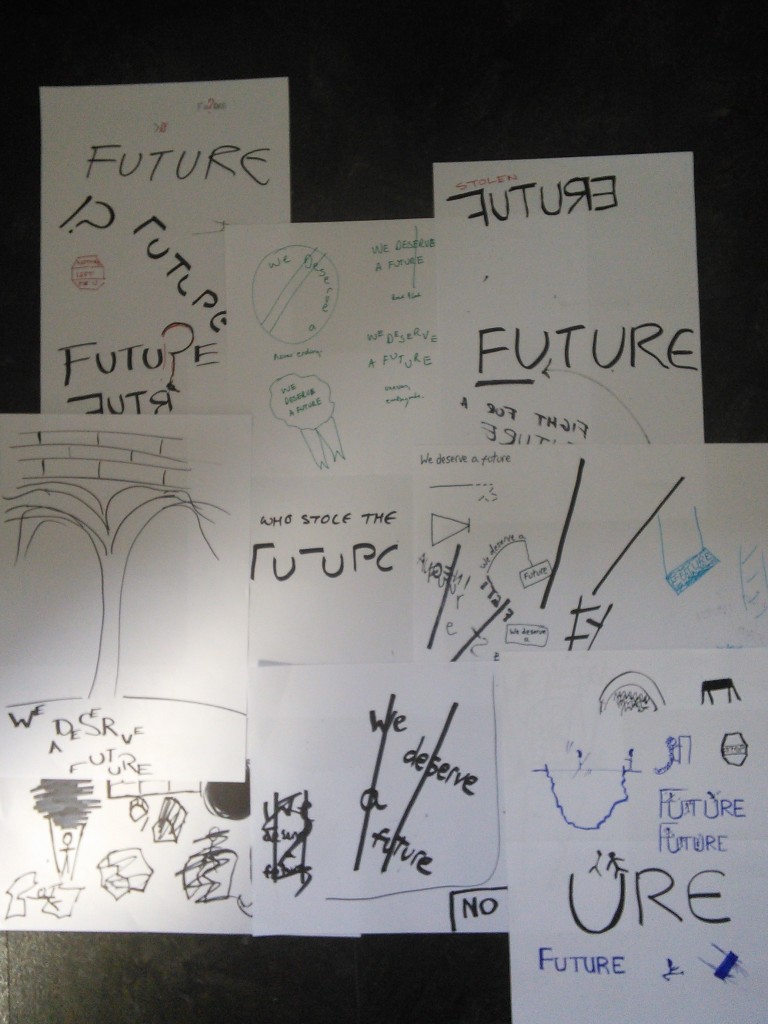 In the final session on Friday, Tangent Graphic came together with participants to explore how design can help to achieve activist aims. Looking back at some of their own projects (which include Glasgow’s Commonwealth Games and the Common Weal movement), Tangent drew on their experiences of designing logos, slogans and branding, noting the importance of arriving at a simple message answering the question “what are you all about” and the value of conveying that in ways that other people can easily reproduce.
In the final session on Friday, Tangent Graphic came together with participants to explore how design can help to achieve activist aims. Looking back at some of their own projects (which include Glasgow’s Commonwealth Games and the Common Weal movement), Tangent drew on their experiences of designing logos, slogans and branding, noting the importance of arriving at a simple message answering the question “what are you all about” and the value of conveying that in ways that other people can easily reproduce.
The designers then led a workshop in which attendees sketched initial ideas for their own designs on an issue. Participants chose to work on the issue of insecure work, brainstorming ways to visualise and express their message. Reflecting on their designs, attendees agreed on the importance of having a positive focus in campaign communications.
Hacking Campaigns from Around the Globe
On Saturday morning we wound the event up with a campaign hack. Walton Pantland gave participants an overview of some inspiring campaigns from around the world. Highlighting Fight for $15, Unite New Zealand and the Ritzy Living Wage campaigns, Walton broke down the essential components in each, looking at their tactics and goals, as well as the ways in which they make connections outside of their own movements, touching on campaigns such as Occupy, Fast Food, Black Lives Matter and the impact on mainstream political landscapes.
Drawing on software methodologies such as Agile, Walton advocated an iterative development model in activism, experimenting, remixing and continuously improving to build impact. He also took a moment to note the increased role of women in recent activist successes. 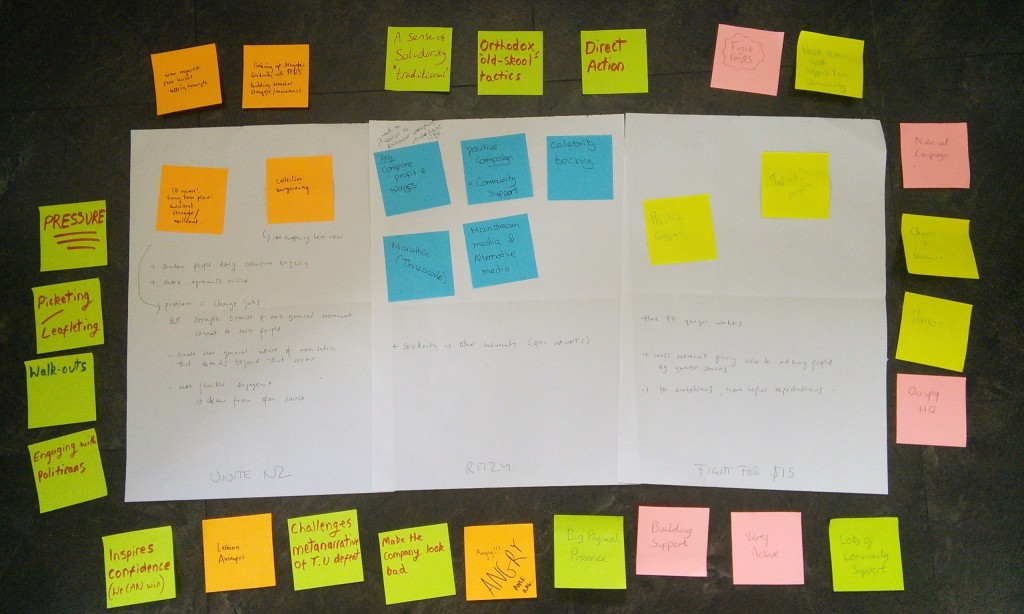 Finally we came together with participants to hack the global campaigns we had learned about, breaking them down into their component parts and encouraging attendees to consider the potential usefulness of these elements in their own campaigns. The group highlighted the importance of learning from campaigns that don’t work as well as those that do, the difficulty of challenging the prevailing narrative of inevitable progress and the value of having ambitious demands and expectations.
Finally we came together with participants to hack the global campaigns we had learned about, breaking them down into their component parts and encouraging attendees to consider the potential usefulness of these elements in their own campaigns. The group highlighted the importance of learning from campaigns that don’t work as well as those that do, the difficulty of challenging the prevailing narrative of inevitable progress and the value of having ambitious demands and expectations.
We wound the session up by inviting those present to give us honest feedback on the event as a whole—participants then went on to take part in the anti-racist Refugees Welcome Here demo happening in Glasgow that day.
1,000s of anti-racists came out today in Glasgow to reject racism. Proud to say it loud, #RefugeesWelcome! #M19Scot pic.twitter.com/Y2IoLJ0L3A — Anti-Racism Scotland (@SUTRScotland) March 19, 2016
As always Jen and Sue learned a lot during this event, which continued to strengthen our belief in the value of using a creative, open approach to both activism and learning. This experience particularly crystallised the importance of creating an open dialogue within any learning process, adapting to attendees’ input throughout, inviting continuous feedback and putting participants in control of the learning pathway as often as possible. This blog post represents our continued commitment to documenting and sharing what we learn.
